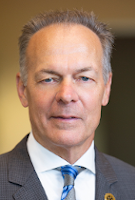
The CEO Roundtable on Cancer announced today that William C. Louv, PhD, will step down as the organization’s chief executive officer on Dec. 31, 2023. A search is underway to find a successor.
Louv has served as CEO of the Roundtable since 2022 and as president of Project Data Sphere® since the Roundtable formed the research initiative in March 2018.
Under Louv’s leadership, the Roundtable expanded its membership while also launching several new projects, including its Going for Gold initiative with historically black colleges and universities and Hispanic-serving institutions across the United States.
 “It has been a privilege to serve an organization that has made real strides in reducing the risk of cancer, enabling early diagnoses, and improving access to oncology clinical trials and quality cancer care,” said Louv.
“It has been a privilege to serve an organization that has made real strides in reducing the risk of cancer, enabling early diagnoses, and improving access to oncology clinical trials and quality cancer care,” said Louv.
“Bill’s experience with big data and analytics has made the Roundtable an even more effective tool in the fight against cancer,” said David Reese, PhD, chair of the Roundtable’s Board of Directors. “We have benefited tremendously from his leadership and insight.”
Louv joined the pharmaceutical industry in 1986 as head of biostatistics at Merrell Dow and advanced to vice president of Biostatistics, Epidemiology, and Clinical Data Management at GlaxoWellcome in 1998. He made a significant career change in 1999, when he became vice president of IT for GlaxoSmithKline’s R&D organization. He was named chief information officer for GSK in 2007.
In 2011, Louv was promoted to senior vice president of core business services, which included IT, procurement, accounting, and real estate. He was a member of GSK’s Corporate Executive Management team from 2007 until his retirement in May 2016.
Louv has consulted with many organizations on health care analytics and opportunities to leverage big data. He is a non-executive director of River Logic Inc., a leader in prescriptive analytics and integrated business planning.
In his early career, Louv was a member of the technical staff at Bell Laboratories where he developed forecasting algorithms for signaling networks. He later served as an associate professor of biostatistics at the University of Alabama at Birmingham. While at these organizations, he published more than 25 academic papers.
